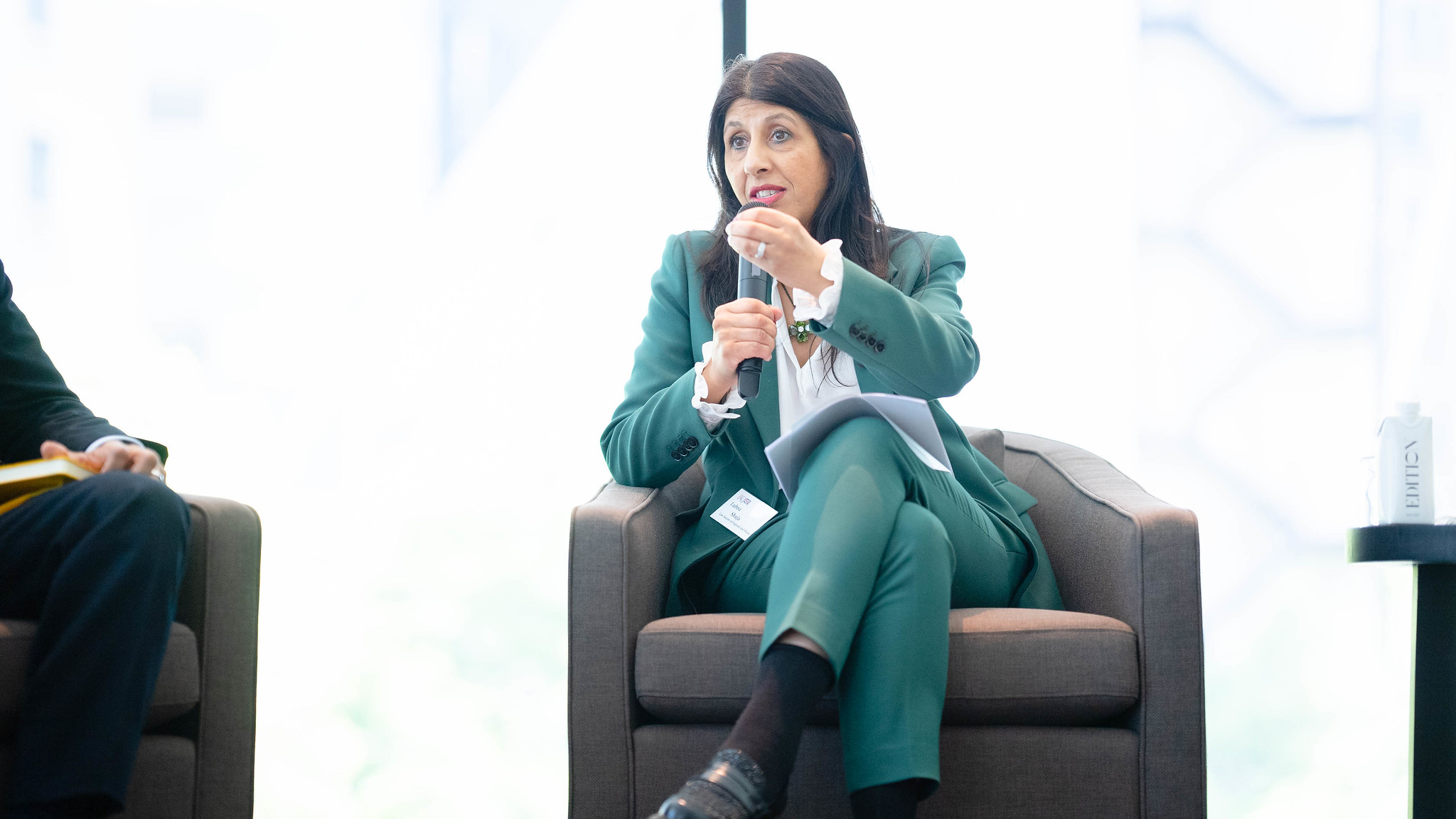Member? Please login
A fireside chat with The Law Society president

Written by Sterling Content
May 15, 2023
Diversity & Inclusion, Past Event Round Ups
The historic 2020 Comprehensive Economic Partnership Agreement (CEPA) between Japan and the UK paved the way for greater market opening, including in legal services. But with bureaucratic requirements for foreign lawyers to register in Japan still in place, British negotiators and legal organisations continue to push Tokyo to further open up the market.
The UK’s legal market hosts some 200 foreign law firms from more than 100 jurisdictions, contributing to a legal services market worth £60 billion annually. Japan, on the other hand, has been described as “relatively closed” in comparison.
The Law Society reported around 209,000 solicitors on the roll as of 2021, contrasting with Japan’s estimated 43,000 registered lawyers. Yet, of the 436 people registered in Japan as gaiben (registered foreign lawyer) in April 2020, only 77 were UK-qualified.
Among the organisations working to achieve enhanced market access for English- and Welsh-qualified solicitors in Japan and supporting Japanese lawyers in the UK is The Law Society, the independent professional body for solicitors in England and Wales.
This bilateral work, together with issues such as free trade agreements and diversity, equity and inclusion (DEI) initiatives, were among the topics raised during a fireside chat with Lubna Shuja, president of The Law Society, which was hosted by the British Chamber of Commerce in Japan on April 18. She was joined in the discussion by Sophie Dyer, counsellor of trade policy at the British Embassy Tokyo, and moderator James Nepaulsingh, a Tokyo-based senior legal counsel and BCCJ Executive Committee Member.
Market access
Having been part of the negotiating team behind the UK–Japan CEPA and the UK’s March 2023 accession to the Comprehensive and Progressive Agreement for Trans-Pacific Partnership (CPTPP), Dyer said the opportunity to participate in the CPTPP Professional Services Working Group would be an important vehicle to seek liberalisation.
Similarly, England-based Shuja said her trip to Tokyo had included talks with Japan’s Ministry of Justice (MOJ) on addressing the difficult process for foreign-qualified lawyers to register in Japan, including documentation requirements and the time taken to register.
“We will be distributing a report to our members on our visit. We are here to speak to members: [to learn] what their challenges are and what we can do to address them,” she said.
Shuja noted the MOJ had signalled a willingness to examine where they can reduce the number of documents required for individual lawyers, albeit without committing to a timeframe.
She also noted that Tokyo-based Anderson Mori & Tomotsune, one of the largest and most diversified law firms in Japan, established an office in London in September 2022. The base highlights the ease of access for Japanese lawyers and law firms to the UK market.
DEI
Having made history as the first Asian, first Muslim and only seventh woman to lead The Law Society, which was founded in 1825, Shuja pointed to the importance of DEI in the legal profession.
“When I first joined the profession in 1990, there were only 709 solicitors from a Black, Asian or minority ethnic background. But I’m delighted to say those groups now make up 18% of the profession, which is higher than the overall proportionate percentage of the population in England and Wales,” she said.
“When I joined my first firm, women couldn’t wear trousers in court. Women now make up 53% of those practising in the profession,” she added. In contrast, women make up 19% of the legal profession in Japan, up from 3.1% in 1980.
However, Shuja noted the need to increase representation of Black, Asian and other minority ethnic lawyers, as well as women lawyers, in higher echelons of the profession.
“We have initiatives in place to move the dial further, including a diversity, equity and inclusion toolkit for law firms … Many firms have also signed up to doing initiatives specifically for women,” she said.

DEI initiatives include mentoring as well as “reverse mentoring,” where a junior employee mentors someone more senior, training in “unconscious bias” and “blind recruitment,” where law firms deliberately remove applicants’ names, addresses and universities from the application process.
“The key thing about diversity, equity and inclusion is it’s got to start at the top level,” she said. “[Leaders] need to be willing to make the change and step out of their comfort zone.”
And with Japan assuming hosting of the G7 Summit over May 19–21, 2023, Dyer said equality and inclusion is an important theme for G7 countries , despite a “slow pace of change” in Japan.
Asked what advice she would give her younger self, Shuja suggested young women take “opportunities that come, and get out of your comfort zone,” adding that “people have pushed me out of my comfort zone, and that’s where you grow.”
Similarly, Dyer stressed the need to “get over things quicker if they don’t go your way.”
New trends
Asked about the retention of young lawyers, Shuja said the current tightness of the UK labour market has made it important for firms to offer hybrid work environments, particularly at the moment as staff preferences and needs have been changed by pandemic-period habits.
“I was speaking to a partner in a firm who had advertised for lawyers to work at their office … They interviewed a number of candidates and offered the job to two people, telling them they just needed to come into the office once a week on a Wednesday. They both turned the job down and said they only wanted to come in once a month,” she said.
Significantly, The Law Society surveys have found both male and female lawyers are seeking more flexible working practices, changing traditional divisions of household labour.
A question from the audience addressed artificial intelligence (AI), particularly amid the rise of technology such as ChatGPT, an AI chatbot released in November 2022.
“ChatGPT is a very hot topic at the moment,” Shuja said. “At one end of the spectrum, firms are very keen to embrace the technology, using AI for process-driven practices. Then, at the other end, there are people who are a bit frightened of it. But everyone realises we need to move with the times.”
Whatever the future holds, The Law Society is prepared to drive excellence in the legal profession.







